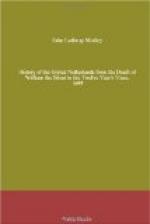The States-General remained virtually supreme, receiving envoys from all the great powers, sending abroad their diplomatic representatives, to whom the title and rank of ambassador was freely accorded, and dealing in a decorous and dignified way with all European affairs. The ability of the republican statesmen was as fully recognised all over the earth, as was the genius of their generals and great naval commanders.
The People did not exist; but this was merely because, in theory, the People had not been invented. It was exactly because there was a People —an energetic and intelligent People—that the republic was possible.
No scheme had yet been devised for laying down in primary assemblies a fundamental national law, for distributing the various functions of governmental power among selected servants, for appointing representatives according to population or property, and for holding all trustees responsible at reasonable intervals to the nation itself.
Thus government was involved, fold within fold, in successive and concentric municipal layers. The States-General were the outer husk, of which the separate town-council was the kernel or bulb. Yet the number of these executive and legislative boards was so large, and the whole population comparatively so slender, as to cause the original inconveniences from so incomplete a system to be rather theoretic than practical. In point of fact, almost as large a variety of individuals served the State as would perhaps have been the case under a more philosophically arranged democracy. The difficulty was rather in obtaining a candidate for the post than in distributing the posts among candidates.
Men were occupied with their own affairs. In proportion to their numbers, they were more productive of wealth than any other nation then existing. An excellent reason why the people were so, well governed, so productive, and so enterprising, was the simple fact that they were an educated people. There was hardly a Netherlander—man, woman, or child— that could not read and write. The school was the common property of the people, paid for among the municipal expenses. In the cities, as well as in the rural districts, there were not only common schools but classical schools. In the burgher families it was rare to find boys who had not been taught Latin, or girls unacquainted with French. Capacity to write and speak several modern languages was very common, and there were many individuals in every city, neither professors nor pedants, who had made remarkable progress in science and classical literature. The position, too, of women in the commonwealth proved a high degree of civilization. They are described as virtuous, well-educated, energetic, sovereigns in their households, and accustomed to direct all the business at home. “It would be ridiculous,” said Donato, “to see a man occupying himself with domestic house-keeping. The women do it all, and command absolutely.” The Hollanders, so rebellious against Church and King, accepted with meekness the despotism of woman.




